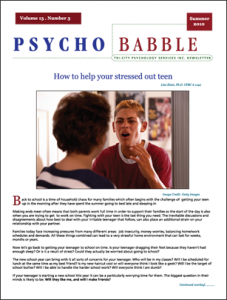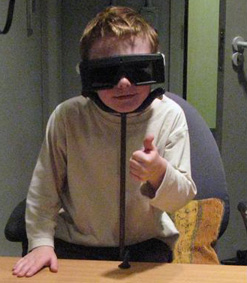Published: September 17, 2010
 Back to school is a time of household chaos for many families, which often begins with the challenge of getting your teen up in the morning after they have spent the summer going to bed late and sleeping in.
Back to school is a time of household chaos for many families, which often begins with the challenge of getting your teen up in the morning after they have spent the summer going to bed late and sleeping in.

Dr. Lisa Eisen, (CPBC #1144) a psychologist who practices at
Tri-City Psychology Services , offers some practical advice on how to help your stressed out teen in our latest issue of Psychobabble.
link to download PDF
link to read more issues of Psychobabble
Published: September 16, 2010
From today’s ( Sept 16th,2010) Corrections page in the New York Times:
An article on Aug. 10 about spinal fluid tests in Alzheimer’s research left the incorrect impression that the test can predict the disease with 100 percent accuracy in all patients. (That impression was reinforced by the headline.) In fact, the test was found to be as much as 100 percent accurate in identifying a signature level of abnormal proteins in patients with memory loss who went on to develop Alzheimer’s — not in identifying patients who “are on their way” to developing the disease.
The article also misinterpreted an element of the researchers’ findings. Among a group of patients who had memory loss and developed Alzheimer’s within five years, every one had protein levels associated with the disease five years before; it was not the case that “every one of those patients with the proteins developed Alzheimer’s within five years.”
And the article misstated the source from which the finding of 100 percent accuracy was drawn. It came from a separate set of patients that the researchers examined to validate the protein signature they had identified in an initial group. (In the initial group, as the article noted, nearly every person with Alzheimer’s had the signature protein levels.) (Go to Article)
Published: September 16, 2010

image:stockXpert
joint study by Indiana University and Columbia University researchers found no change in prejudice and discrimination toward people with serious mental illness or substance abuse problems despite a greater embrace by the public of neurobiological explanations for these illnesses.
The study, published online Sept. 15 in the American Journal of Psychiatry, raises vexing questions about the effectiveness of campaigns designed to improve health literacy. This “disease like any other” approach, supported by medicine and mental health advocates, had been seen as the primary way to reduce widespread stigma in the United States. [continue reading…]
Published: September 15, 2010
Unlike adults, children are able to keep information from their senses separate and may therefore perceive the visual world differently, according to research published today.
 Scientists at UCL (University College London) and Birkbeck, University of London have found that children younger than 12 do not combine different sensory information to make sense of the world as adults do. This does not only apply to combining different senses, such as vision and sound, but also to the different information the brain receives when looking at a scene with one eye compared to both eyes.
Scientists at UCL (University College London) and Birkbeck, University of London have found that children younger than 12 do not combine different sensory information to make sense of the world as adults do. This does not only apply to combining different senses, such as vision and sound, but also to the different information the brain receives when looking at a scene with one eye compared to both eyes.
Image: A participant in the vision study.
Credit: Marko Nardini.
The results, published today in the Proceedings of the National Academy of Sciences, imply that children’s experience of the visual world is very different to that of adults. link to continue reading
Source: University College of London
 Back to school is a time of household chaos for many families, which often begins with the challenge of getting your teen up in the morning after they have spent the summer going to bed late and sleeping in.
Back to school is a time of household chaos for many families, which often begins with the challenge of getting your teen up in the morning after they have spent the summer going to bed late and sleeping in.


